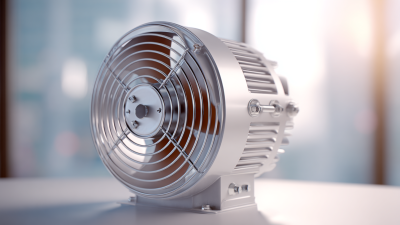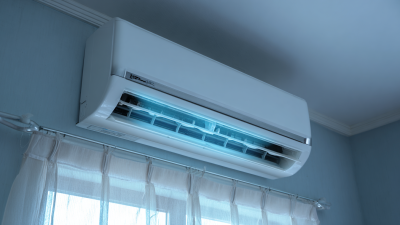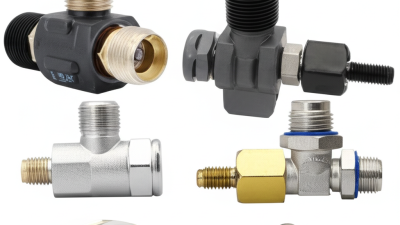




Fan motors are an essential component across a multitude of industries, driving efficiency and innovation in ways that are often underestimated. According to a report by Research and Markets, the global fan motor market is projected to grow at a CAGR of 6.1% from 2021 to 2026, reflecting a strong demand for advanced technologies that improve performance and energy efficiency. From HVAC systems in commercial buildings to cooling solutions in data centers, the innovative applications of fan motors are reshaping how industries operate. The integration of smart technologies and IoT capabilities has further enhanced the functionality of fan motors, enabling predictive maintenance and improved resource management. As industries increasingly prioritize sustainability and energy efficiency, the role of fan motors is becoming more critical, showcasing their versatility and importance in modern industrial applications.

The evolution of fan motor technology has dramatically transformed industrial performance across numerous sectors, introducing innovative trends that enhance efficiency and sustainability. One standout trend is the integration of smart technology into fan motors. These motors now incorporate IoT capabilities, allowing for real-time monitoring and control, which can optimize energy usage and predict maintenance needs. As industries move towards more automated processes, such advancements lead to reduced downtime and improved operational efficiency, crucial for maintaining competitive advantages.
Another significant trend is the shift towards energy-efficient designs. Manufacturers are increasingly adopting permanent magnet synchronous motors (PMSMs) and electronically commutated motors (ECMs), which not only consume less power but also produce less heat, thereby improving overall system reliability. This focus on energy efficiency complements global initiatives aimed at reducing carbon footprints. Furthermore, advancements in materials science have led to the development of lightweight yet durable components, enabling fan motors to operate more efficiently while meeting the rigorous demands of various industrial applications. These innovations collectively contribute to a future where industrial operations are not only more productive but also environmentally responsible.
In the realm of HVAC and cooling systems, the importance of energy efficiency cannot be overstated. Fan motors play a critical role in optimizing energy use, directly impacting operational costs and environmental sustainability. Advanced fan motor technology has led to the development of high-efficiency models that can significantly reduce energy consumption while maintaining optimal airflow. By utilizing variable speed drives and smart controls, these motors adjust their performance based on real-time demand, minimizing waste and enhancing overall system efficiency.
Moreover, the integration of fan motors with advanced monitoring systems provides valuable insights into energy usage patterns. These systems can track performance metrics, allowing for predictive maintenance and timely adjustments to improve energy efficiency further. As industries increasingly prioritize sustainability, the adoption of energy-efficient fan motors not only supports compliance with regulatory standards but also contributes to significant cost savings over time.
This innovation marks a turning point in how industries can leverage technology to create more sustainable and efficient operational practices in HVAC and cooling systems.
The rise of robotics and automation has ushered in a new era of technological innovation, with brushless DC motors playing a crucial role in this evolution. These motors offer exceptional efficiency and reliability, making them ideal for applications where precision is paramount. In robotics, they enable smooth and responsive movements, which are essential for tasks ranging from delicate surgical procedures to heavy industrial assembly lines. Their ability to maintain performance over a wide range of speeds without the need for brushes reduces wear and tear, significantly extending the lifespan of robotic systems.

Moreover, brushless DC motors have found their niche in automation processes by enhancing energy savings and performance. Their compact design allows for integration in tight spaces, which is particularly beneficial in automated manufacturing and logistics environments. By providing real-time feedback and control, these motors contribute to smarter automation systems that adapt quickly to changing conditions. As industries continue to advance towards increased efficiency and reduced operational costs, the implementation of brushless DC motors in robotics and automation is set to grow, driving further innovations in how machines interact with their environments.
The automotive industry is undergoing a significant transformation with the rise of electric vehicles (EVs), and fan motors play a pivotal role in this revolution. Designed to enhance efficiency and performance, fan motors are essential components in EV climate control systems. They provide precise airflow management, ensuring that batteries and other key components maintain optimal operating temperatures. By doing so, they contribute to the overall longevity and performance of electric vehicles, making them more reliable and appealing to consumers.
Moreover, fan motors in electric vehicles are not just functional but also contribute to the sustainability narrative. By optimizing aerodynamics and reducing energy consumption, innovative designs of fan motors help maximize the range of EVs without compromising comfort. This advancement aligns with the broader push for sustainable transport solutions, enabling a cleaner future. As more automakers integrate advanced fan motor technologies, the industry takes one step closer to achieving greater energy efficiency and reducing the carbon footprint of transportation.
The manufacturing landscape is undergoing a significant transformation, driven largely by the integration of smart technologies into operational processes. These advancements have not only enhanced productivity but also revolutionized the energy efficiency of fan motors used across various industries. As Industry 4.0 takes hold, the deployment of smart sensors and IoT devices allows for real-time monitoring and predictive maintenance, resulting in optimized performance and reduced downtime. This shift is essential for meeting the growing demand for energy-efficient motors, as organizations strive to lower operational costs while addressing environmental concerns.
Moreover, the impact of smart technologies extends beyond mere operational efficiencies; it fosters a more innovative approach to fan motor applications. Industries are increasingly utilizing advanced algorithms for better airflow management, ensuring that the fans operate at peak efficiency. By harnessing data analytics and machine learning, manufacturers can adjust fan operations based on real-time conditions, enhancing not just energy savings but also product performance and longevity. This intersection of smart technology and fan motor innovation is paving the way for sustainable manufacturing practices, ultimately shaping the future of various industrial sectors.









